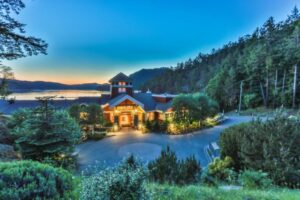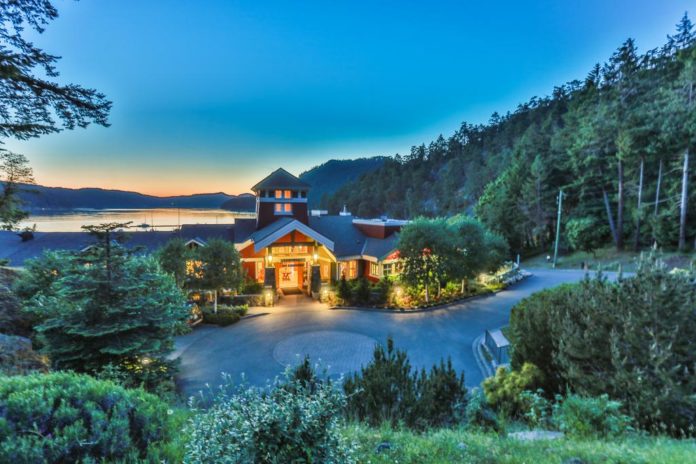A 365 day challenge with Mother Earth
Remember March 2020, when the scare of a new infectious disease COVID-19 was at its peak, when suddenly thousands of people were dying of this new epidemic never heard of before when the entire world had shut down and most of us were asked to hide behind our masks, inside the four walls of our homes, huddled behind our computers and stay away from friends and family. While we did all that, this adventourous couple instead entered into a year long challenge where they pledged to eat only what they grew, catch, forage, harvest and raise.
Shocked! Of course. This feels like going back to the 18th century when box stores selling plant or machine produced foods did not exist. That is what human beings did back then. And then multinational companies came and started thrusting chemically produced food down our throats. It wasn’t difficult to adapt to the change as it saved us time; from going into the jungles to hunt animals or spending hours harvesting our own vegetables or wheat. Slowly, human beings forgot how their food was grown and enjoyed their freedom.
Christopher Hall, 38 and Stefanie Lowey, 24 who worked in the hospitality industry suddenly were left jobless. Money was scarce, but time was aplenty. Though both of them were city-bred, never having lived or experienced farm life decided to enter into this experiment. The reporter traveled to Pender Island, to see for herself the success of their challenge as it came to an end after 365 adventourous days, in August this year. Pender Island is located in the Gulf of Georgia, British Columbia, Canada. Pender Island is approximately 34 km² in the area and is home to about 2,250 permanent residents, as well as a large seasonal population.
They celebrated their successful journey with Mother Earth with a bottle of bubbly champagne, that had been lying in their home for a year. Before they started their journey, they gave away all the packaged food, including tea and coffee and started their own little farm, including honey and coffee along with the 75 varieties of vegetables. In an attempt to keep themselves motivated and accountable, the daring couple recorded their journey on social media, gaining followers from as far away as India and Russia.
Excerpts from an interview
Today you complete one year of simple living. How does it feel?
It not only feels good, but also feels accomplished. It definitely wasn’t easy, but we stuck with it for a year and now feel excellent. Making our journey public and encouraging comments and suggestions from followers certainly kept us inspired and accountable,
How was your pre-pandemic life?
Both of us grew up in the city of Vancouver and moved to Pender Island about six years ago. I met Stefanie when she moved here about 3 years ago. We have been dating for over a year since we started. Both of us lost our jobs during the pandemic and certainly, life was tough.
Living off the land – was this a lifelong dream or was it just an attempt to save money?
I always had it at the back of my mind and wanted to take this challenge one day. The pandemic certainly put it in perspective. I never would have done it but due to the pandemic situation when grocery stores were running out of items. It made me realize how reliant we are on these box stores and never think about where exactly our food is coming from. The pandemic, of course, was a big motivator and money was scarce too.
What are the plants/animals you grow and catch? Which has been the most challenging and why. What new have you learned?
The aim was to consume only what we could catch, grow, forage and raise. We raised chickens, turkeys and ducks. Poultry was definitely new for us and a learning experience for us. Both of us grew up in the city and had no farming experience at all. We were getting suggestions from all over the world, we went online to learn how to grow or raise anything; if we had a question we would post it on social media and suggestions would pour in. Social media was not only a motivator but also a teacher.
We started our challenge last August with a small vegetable garden, and by the end, we were growing 75 varieties of vegetables. For the first month, we had no chicken or eggs, only seafood. It took 4-5 months of raising chickens that we had our first egg.
Are you still visiting the grocery stores? For what items?
During the time, we had visited the stores only once or twice. That too is only for toilet paper or dish soap, hygiene products but no food items. We even made our own salt from the ocean. We also made our own coffee from dandelions and did not eat bread or wheat products for a year.
We had a beehive to get honey. On the internet, we learned that having an apiary can be a wonderful addition to our little farm as the bees natural pollination helps the growth of vegetables and garden plants.
For protein, we caught lot of seafood – crabfish and prawn. This was a new experience for us. But going out in the boat with our nets was entertaining too.
For vegetables, we grew tomatoes, peppers, cucumbers, zucchini, lettuce, kale, forage for fruits aple trees, blackberries, lots of mushrooms. We also ate seaweed.
Living on the island, there are a lot of natural growth of fruits and plants, but we did our research and did not eat anything blindly. It wasn’t difficult to forage fruits like berries or plum and apple trees on the island.
Did your neighbors not object to your experiment, especially with bees around?
Actually, our neighbours wre very helpful and even helped us with their knowledge in supporting our journey. They found our experiment interesting. We have a good relationship with our neighbours. We checked with the neighbors before we started and throughout communicated with them.
I won’t deny it that initially there was a communication gap in the beginning. We had a lady on the island who soon became our mentor. We learned how to inspect bees and did an online course to raise bees and eventually bees became friendly. Local people helped a lot.
How was winter? Were you able to cope with the food you grew during the season? What did you have to give up or compromise with?
We were lucky that we live in southern gulf island. Vegetables like kale, swiss, chards, beets survive the winter and then we added seaweed in our diet to supplement. We also came up with creative ways, like adding wheatgrass, to our diet. We tried to balance each meal. We freeze a lot of black berries or fruits by batching them 12 bags, for each month.
What exactly did you miss?
For me, I missed coffee and Stef missed pizza. After 3-4 months of growing, we had just one bag of flour. So we could not bake bread and just used it for gravies.
Do you think you are healthier now?
Definitely we are healthier now. I lost 40 lbs and Stef lost 30 lbs. Our body certainly is healthier though we never went to the gym an active lifestyle is good for your body. We lifted a lot of weight by moving things around and always outdoors certainly helped. We got our blood work done before and after the challenge and certainly, there is nothing alarming.
Reports have suggested that divorce rates went up during the pandemic. How has your relationship been? Has it blossomed or are you now sick of each other? Pandemics could not even keep Bill Gates and Belinda together.
(Laughing)
Of course, the experiment has brought us closer, further along, working so closely, we rely on one another for a lot of things. In the beginning, it was a struggle and we had some figh ts but eventually, we found our niche.
ts but eventually, we found our niche.
How does post-pandemic life look for you? Will you continue with what you have been doing?
We are going to continue for the most part. We enjoyed our lifestyle, but definitely will not be so strict but we will meet We will grow new things, keep adding to our diet and still plan to continue 95% of our challenge.
